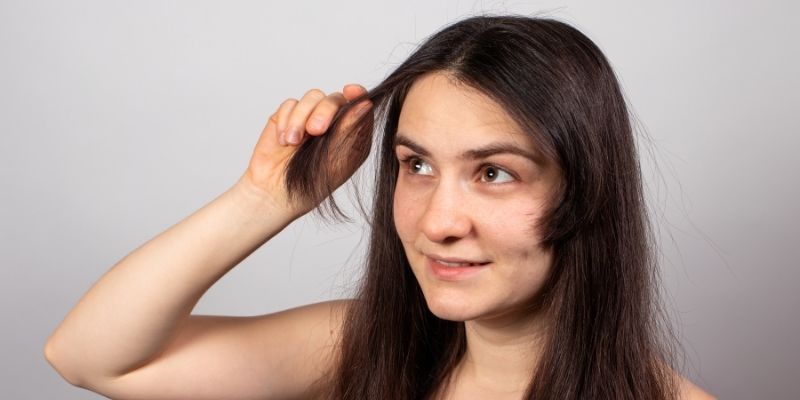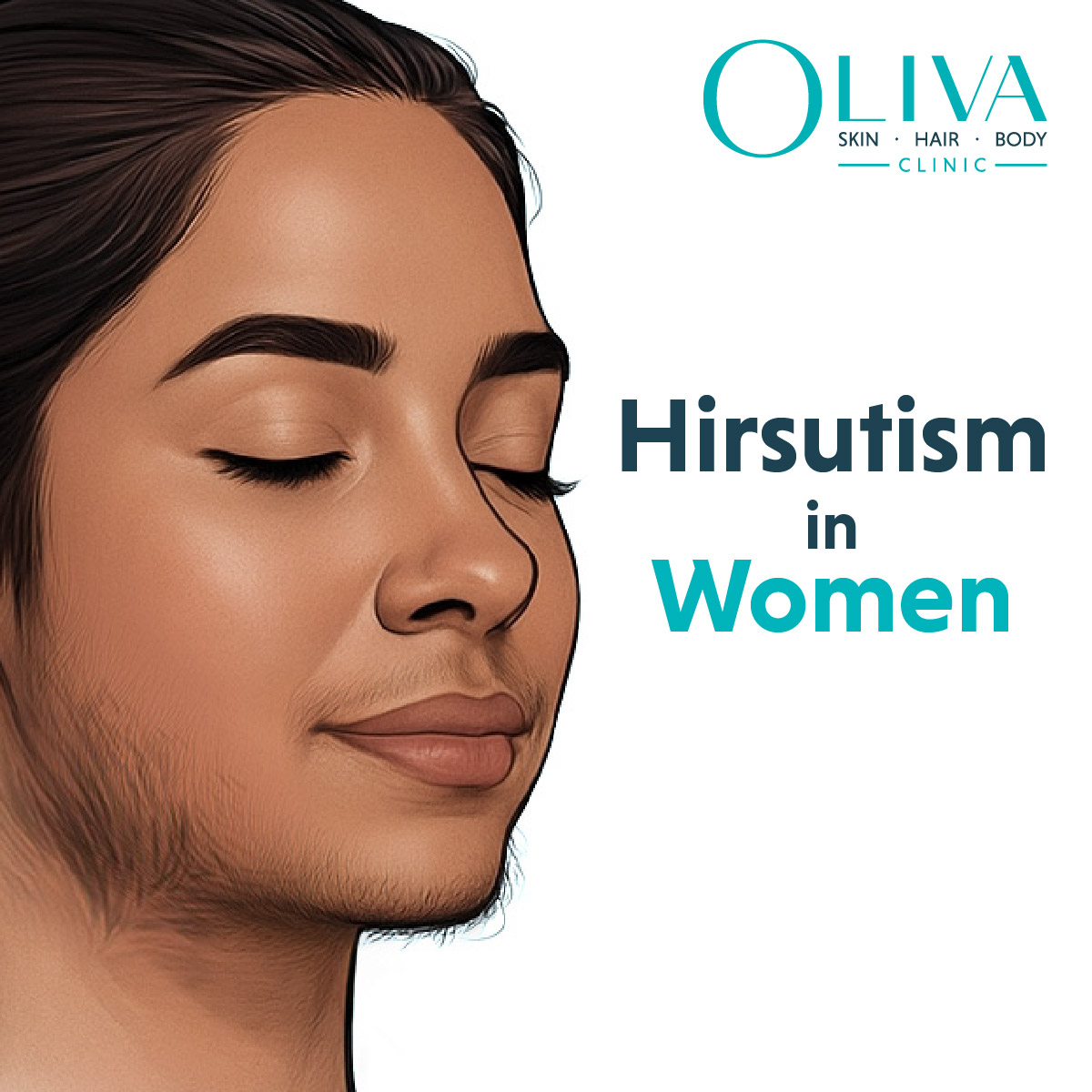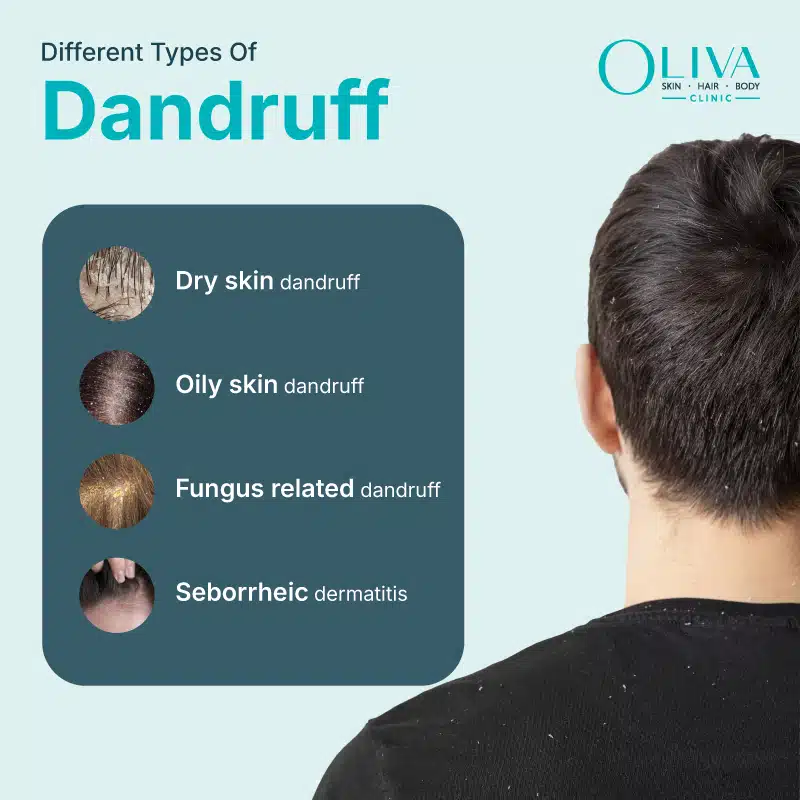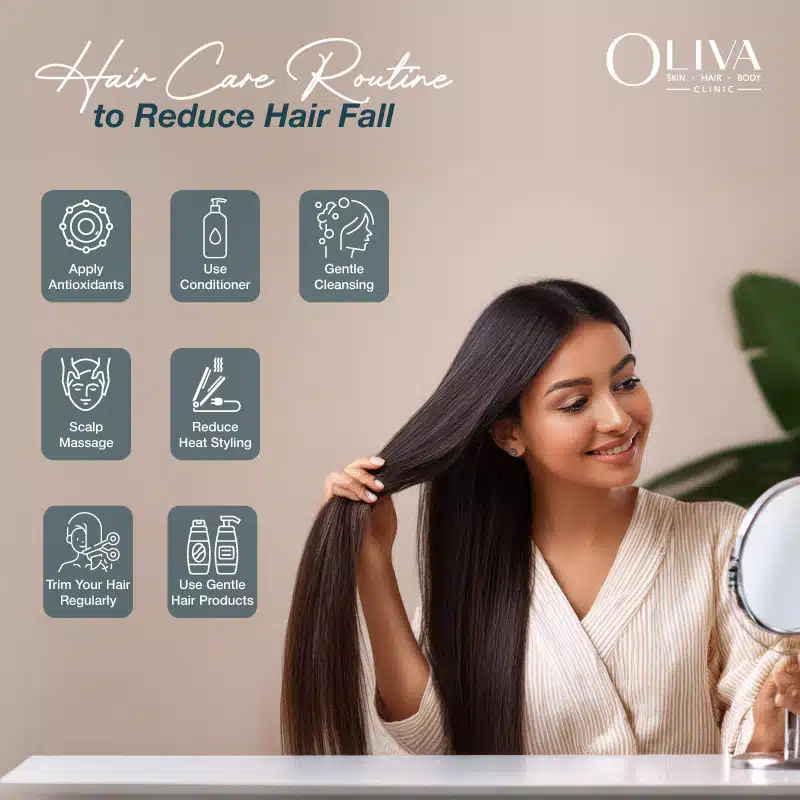In This Article
Melanin-Rich Foods for Healthy Hair and Preventing Greying
It is not uncommon for hair health to take a hit as we age. Dry, brittle hair that quickly starts to turn grey is a common aspect of ageing. This is because ageing slows down melanin production in our body, leading to greying hair, which is often prone to oxidative stress and damage.
This fact often leads one to the question can we manage and improve the depleting melanin levels and boost our hair health? If genetics are the cause, we cannot do much about it, however, in case of other causes, you can reduce greying through a nutritious diet.
In this article, we will understand why and how melanin rich foods for hair work. We will also discover the different foods that increase melanin and how to incorporate them into your diet.
In This Article
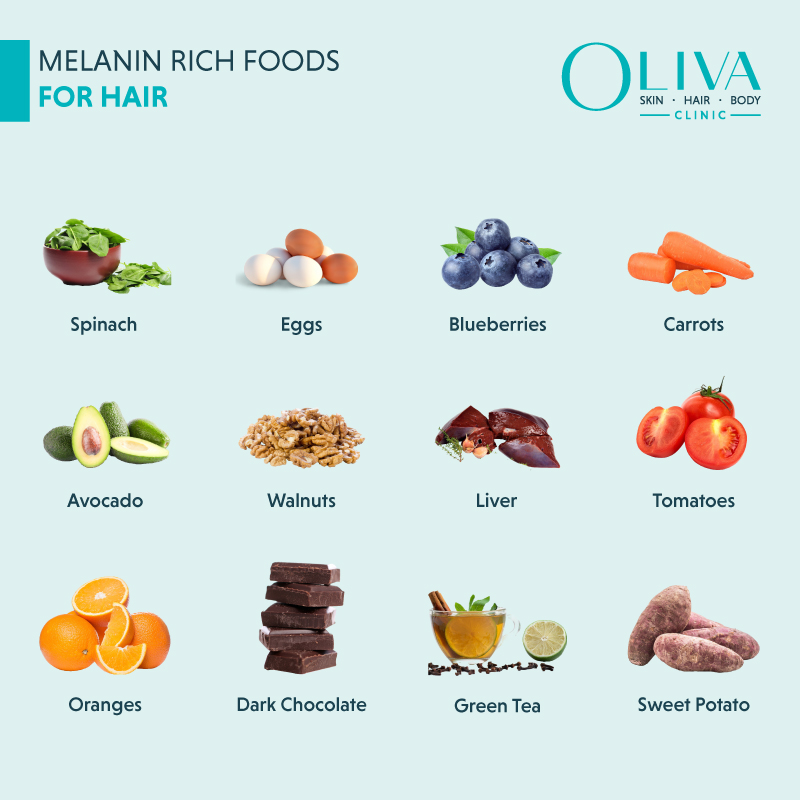
What Is Melanin? & Why Is Melanin Important For Hair Health?
Melanin is a natural pigment that defines the colour of your hair, skin, and eyes. Melanin production takes place inside large cells, i.e., melanocytes, found all over the body. Melanocytes produce melanosomes, which are sub-cellular structures with a specific role to perform in the cell. Your hair is brown, blonde, red, or black, depending on the type and extent of melanin. [1]
However, the role of melanin is not restricted to pigmentation alone. It helps in managing your hair health as well by protecting your hair from UV damage and oxidative stress. Consuming melanin-rich foods boosts its production, protecting your hair from environmental damage while maintaining shine and volume.
Types Of Melanin In The Hair
There are two different types of melanin in the hair Eumelanin and pheomelanin. [2] Melanosomes synthesise them and distribute them across the cells.
-
Eumelanin
Eumelanin gives a dark or brown colour to your hair. There are two types of Eumelanin: Black eumelanin, which makes your hair black, and brown eumelanin which gives different shades of brown depending on how much of it is present.
-
Pheomelanin
Pheomelanin, the yellow or red pigment, gives warm and bright colours to the hair. A high amount of pheomelanin gives a red colour to your hair, and when in smaller quantities, it makes hair yellow.
-
Mixed Melanin
Eumelanin and pheomelanin together form the mixed melanin. This blend gives your hair a range of colours like auburn, light brown, and shades of blonde. [3]
What Causes White Hair?
A decline in melanin production is the main cause of white hair, which slows down as you age. However, if your hair starts greying while you are younger, it could be genetic or due to an underlying health condition.
Here are the various causes of premature ageing:
-
Stress
Studies show that stress can decrease the number of stem cells, resulting in sluggish melanin production. [4]
-
Autoimmune Diseases
When affected by an autoimmune disease, the immune system targets its own cells. When melanocytes affect melanin-producing cells, you will notice greying hair.
-
Thyroid Disorder
Thyroid causes hormonal imbalance, which may lead to premature greying.
-
Vitamin B12 Deficiency
Vitamin B12 is a great contributor to melanin production. A deficiency in Vitamin B12 restricts the supply of oxygen to cells including hair cells which may result in premature greying.
-
Certain Habits
Smoking causes premature greying as it the toxins in cigarettes can affect the hair follicles.
Best Foods Rich in Vitamins, Minerals, And Antioxidants To Boost Melanin In Hair
While genetics are the primary cause of premature greying, nutrient deficiencies also play a role. You can address them by including melanin foods in your diet. [5] Melanin foods for hair include those loaded with antioxidants and rich in vitamins and minerals.
Check out the following table melanin-rich foods:
Food |
Key Nutrients |
Role in Melanin Production |
| Spinach | Vitamin A, C, K1, B6, B9, and E, Folic Acid, Calcium, Iron, Potassium, and Magnesium | Spinach is one of the foods that increases melanin. Vitamin E in spinach protects melanocytes responsible for melanin synthesis from oxidative stress and boosts melanin production. [6] |
| Eggs | Phosphorous, Calcium, Protein, Potassium, Biotin, Sodium, Selenium, Copper, Zinc, Iron, Manganese, and Magnesium | An egg is considered a melanin production food as it is a rich source of protein, biotin, and other nutrients that boost melanin synthesis. Egg yolk contains tyrosine an amino acid that aids melanin production. [7] |
| Blueberries | Vitamin K, C, A, E, B6, B12 Manganese, and Copper | This is one of the best melanin foods for hair. Vitamin B12 reduces the tyrosinase-inhibiting effect of glutathione. This stimulates melanocytes to produce melanin. [8] |
| Carrots | Vitamin A, B6, K1, Biotin, and Potassium | Vitamin A in carrots includes carotenoids that play a vital role in melanin production and UV protection. [9] Carrots are among the melanin-rich foods for hair preventing greying. |
| Avocado | Vitamin A, C, E, B6, Potassium, Folate, Niacin, Riboflavin, Sodium, and Magnesium | Vitamin B6 facilitates the metabolism of Amino acids, especially Tyrosine, the melanin precursor. [10] |
| Walnuts | Copper, Folic Acid, Vitamin B6, Phosphorous, Manganese, and Vitamin E | Copper, Folic Acid, and Vitamin B6 all help in melanin synthesis and aid in melanin production. Hence walnuts are considered a vital food to increase melanin in the hair. |
| Salmon | Vitamin B12, B6, Selenium, Niacin, Thiamine, an Phosphorous | Salmon is a vitiligo food that contains melanin. [11] Also, the vital nutrients like Vitamin B12, B6, and Selenium present in this seafood boost melanin production. |
| Liver | Vitamin A, Riboflavin, Folate, Choline, Copper, and Iron | Vitamin A protects melanocytes from oxidative stress, Riboflavin absorbs UV rays, and copper acts as a coenzyme of Tyrosinase, the enzyme that helps melanin synthesis.[12] |
| Dark Chocolate | Iron, Magnesium, Copper, Zinc, antioxidants, Flavonoids, and Phosphorous | Flavonoids protect melanocytes, the cells that enable melanin synthesis from oxidative damage by stimulating Tyrosinase activity. This process helps melanin production. [13] |
| Green Tea | Antioxidants, Flavonoids, and Caffeine | Flavonoids and antioxidants protect melanocytes that are responsible for melanin synthesis from oxidative stress to enhance melanin production. |
| Oranges | Vitamin C, B6, Magnesium, Calcium, Iron, and Magnesium | Vitamin C protects melanocytes from oxidative stress and B6 enables the metabolism of Tyrosine, the amino acid which is a melanin precursor. |
| Sweet Potato | Vitamin C, A, B6, Copper, Manganese, Potassium, and Niacin | The vitamins A and C in sweet potatoes protect melanocytes from oxidative stress and B6 helps tyrosine metabolism, resulting in better melanin production. |
| Almonds | Vitamin E, Manganese, Potassium, Copper, and Riboflavin | Vitamin E and Riboflavin protect against sun damage, whereas Copper enables Tyrosine metabolism. These properties help in boosting melanin production. |
| Tomatoes | Vitamin A, C, K, Calcium, Iron, Folate, Magnesium, and Potassium | Vitamins A and C with their antioxidant properties aid in melanin production. |
How To Include Melanin-rich Foods In Diet For Better Hair?
Here are some ways in which you can include melanin rich foods for hair in to boost your overall hair health:
-
Breakfast:
Toasted wheat bread topped with mashed avocado and boiled eggs.
-
Mid-morning Snack:
A bowl of walnuts, sliced carrots, and tomatoes, all high melanin foods for hair.
-
Lunch:
You can incorporate melanin rich foods for hair with a lunch bowl of grilled salmon, tomatoes, avocado, and carrots with a drizzle of olive oil and lemon.
-
Evening Snack:
A smoothie with avocado and milk topped with walnuts and almonds is an excellent evening snack option with foods high in melanin.
-
Dinner
Grilled liver with steamed sweet potatoes and roasted carrots is a delicious dinner with melanin rich foods for hair.
Takeaway
Melanin is a natural pigment that defines the colour of your hair. Maintaining adequate levels of melanin is crucial to retain your hair colour. If premature greying is a genetic concern, we cannot resolve it, but in case of other factors like lifestyle habits, hormonal imbalance, medical conditions, you can reduce it by including nutrient-dense food options that boost melanin production.
Consulting a dermatologist can also help you understand your signs better and get the appropriate treatment.
Frequently Asked Questions
Yes, white hair is normal and is often a natural sign of ageing. However, if there is a decrease in melanin production in the hair follicles, your hair starts turning white sooner than it should, sometimes as early as in your 20s or 30s. This could be genetic, due to stress, nutritional deficiencies or certain health conditions. It helps to learn about the cause of your white hair and take the necessary steps.
Genetic factors, stress, smoking, alcohol consumption, UV damage, and nutritional deficiencies affect melanin levels in hair. Also, hormonal imbalances, especially during pregnancy or menopause and due to medications or health conditions, may affect melanin levels in hair.
Eat melanin rich foods for hair like salmon, carrots, citrus fruits, green vegetables, etc.
Include nutrient-dense, melanin-rich foods in your diet. You can choose from a variety of options provided in this article.
Foods rich in copper, vitamin C, E, and antioxidants, like lentils, citrus fruits, dark chocolate, nuts and seeds, shellfish, etc., have the most melanin.
Yes, you can increase melanin by eating more melanin rich foods, unless it is genetic.
Yes. Melanin supplements with nutrients like vitamins C, E, B12, copper, iron, etc., boost melanin production and help increase melanin in the hair.
Yes. Milk is one of the melanin rich foods for hair. It contains nutrients like calcium and vitamin B12 that regulate melanin production.
If genetics are the reason for less melanin production, it cannot be restored. However, if it is due to a medical condition or hormonal imbalance, you can manage it by consuming foods with melanin for hair.
Eat more melan rich foods for hair, like green leafy vegetables, nuts and seeds, seafood, etc., as they help protect your hair from sun damage.
Melanin protects your hair from sun damage by absorbing UV rays that can damage melanin production.
Greying hair is part of the natural ageing process. If your hair turns white due to genetic factors, you cannot prevent it. But, if it occurs due to health conditions, you can reduce it by eating nutrient-rich foods while avoiding foods that decrease melanin, like processed foods, caffeinated beverages, sugar, etc.,.
You can increase melanin in black hair by consuming foods rich in copper, vitamins B12, E, C, A, copper, and antioxidants. Staying hydrated and protecting your hair from sun damage will also help.
Fried foods, refined carbs, caffeinated beverages, and processed foods are some of the foods that decrease melanin.



